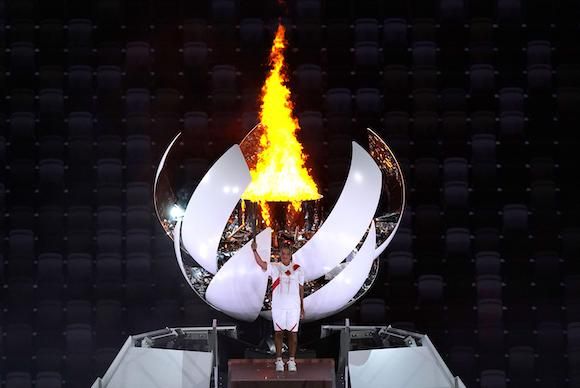The BBC is no stranger to criticism, but its sparse coverage of the Tokyo Olympics has united Britain’s Olympics chief, the head of the national rowing team and two former chairmen as well as fans of sports from dressage to taekwondo—not to mention hundreds of viewers who had no idea how annoyed they would be about not being able to watch the men’s BMX final live on air.
Jacquie Hughes, a former BBC editor and commissioner who has advised the Lords Communications and Digital Committee on the future of the corporation, was surprised by the reduced coverage of the Olympics. “Even though it wasn’t necessarily the BBC’s fault, the reduction in available sports to view was a real shocker,” she said.
Hughes has a personal interest in the Olympic coverage: a heart-warming video of her watching her son Tom Dean win the first of his two gold medals in the pool went viral. Also spreading on the internet has been criticism of the BBC for sins of omission, which ranged from failing to show Kye Wyte’s medal-winning BMX performance live to cutting away from the crowning of Britain’s most decorated female Olympian, dressage rider Charlotte Dujardin.
Many viewers have blamed the BBC not just for the occasional editing error but also for doing a deal with US giant Discovery in 2016, which cut the amount it could broadcast from a possible 5,000 hours to just 350 at this Olympics and the next. Not just evidence of the BBC facing a hard negotiating partner, this deal is a sign of the fast-changing nature of televised sports coverage, changing media habits and the future of free-to-air television itself.
In the wake of criticism, there have been calls to reconsider the 1996 legislation that offers free-to-air protection for listed sporting events, like the FA Cup final and Wimbledon final, to include more Olympic coverage. Former BBC chairmen Michael Lyons and Michael Grade were among those calling for a review of the listed events regulations, while Hugh Robertson, the chairman of the British Olympic Association, stopped short of criticising the BBC but raised concerns about the impact of losing wider exposure for sports rarely seen on television. (An interesting new website GB Sports Media is set to launch next year with the aim of giving coverage to less popular Olympic sports.)
In the debate about the current coverage, it’s important to remember that the BBC more or less limited its live Olympics coverage to two channels until 2012, when its comprehensive coverage of the London games set a new benchmark for televising the games. So delighted was the Olympic governing body, the IOC, with the huge viewing figures for the London games that it negotiated a separate deal with the BBC for the first time, separate from its European counterparts, which allowed the corporation to show four winter and summer Olympics up to 2020. Informed sources say this deal cost the BBC as little as £60m.
Just three years after this deal, Discovery, the ambitious and deep-pocketed US group which owns pay channel Eurosport, agreed to pay the IOC an unheard-of £920m to control all the rights to televising the Olympics from 2022. As part of its commitment to increase participation (rather than just earn as much as possible) the IOC mandated that Discovery sub-licence at least 200 hours of free-to-air television in each competing country.
The subsequent deal saw the BBC pay some £120m to show live coverage of the 2022 and 2024 games, twice as much as it paid for Rio and Tokyo. A great example, if nothing else, of the inflation in sports broadcasting prices. Not only was the BBC up against an aggressive US dealmaker, its executives were understood to have made a calculation that the chance to show the 2024 games in Paris, with its friendlier time zone, was worth more than the amount it had paid to show Tokyo.
Why has the BBC failed to recognise how much interest there would be in Tokyo? According to sources, this was partly because they thought most people would not mind waiting for a highlights show rather than watching sport in the early hours of the morning every day for two weeks. While this misjudged how much social media in particular has changed viewing demands and habits, the actual viewing figures show that they might have been right.
Some 32.8m viewers watched BBC’s coverage (excluding iPlayer) in the first week of the Olympics, while 1.7m have watched the games on either Discovery+ or Eurosport, paying £7 for the privilege. That these figures are considered a triumph for a pay channel which rarely attracts mass audiences and a relative failure for the BBC underlines many things—one of which is how much the London games did to build expectations of live streaming Olympic coverage on the nation’s largest channel. For example, in 2012, some 26m UK viewers watched the opening ceremony alone when the time was close to midnight.
British viewers, or more accurately older ones, still expect to watch big national and international events on the BBC. Moments to make us all feel good in victory or understand the pain of defeat. The problem is that this demand has come up against spiralling costs for sports rights and a BBC budget which has fallen 30 per cent in real terms over the past decade.
The BBC, faced with the huge cost of broadcasting from Japan, jumped at the chance of doing a deal that would extend its terrestrial power until 2024, when a new deal has to be signed. One former executive close to the negotiating team said: “The BBC would love to show every minute, but they can’t afford to do that anymore.” Sport is also “the first... department to be cut,” he said.
As ever with the BBC, its communication was not the best. As Jacquie Hughes says, “To think you can quietly slip out a reduced version and people won’t notice has really backfired. Even just explaining to viewers what was going on would help. Now they are seen as responsible for ‘poor coverage’ in the absence of people understanding the backdrop.”
By 2024 this backdrop will have changed even more. The BBC is to enter licence fee negotiations expected to be even tougher this time round, while Discovery has continued to expand into the UK, buying WarnerMedia and investing heavily in GB News.
Even in a friendlier political environment the BBC is likely to struggle to get support from the listed events legislation given the fact that it had already agreed to limit its Olympics coverage. When it comes to negotiating the TV rights next time round, it could well find that its US rivals have already got the gold.












